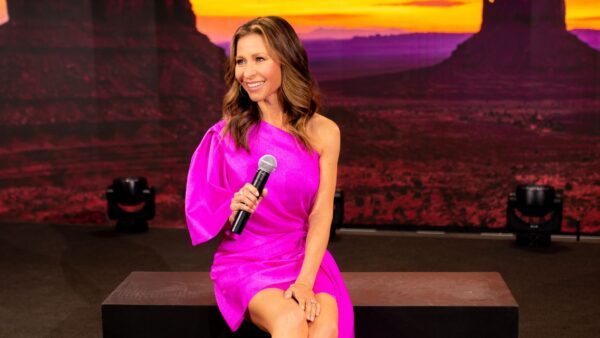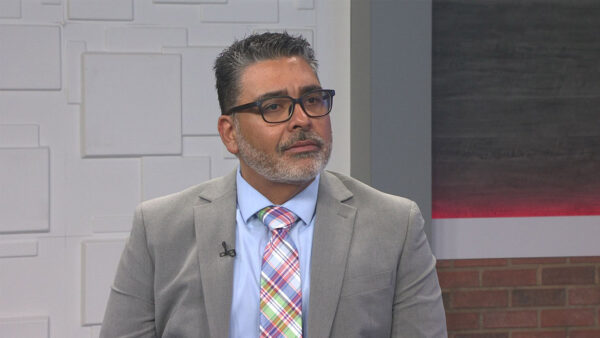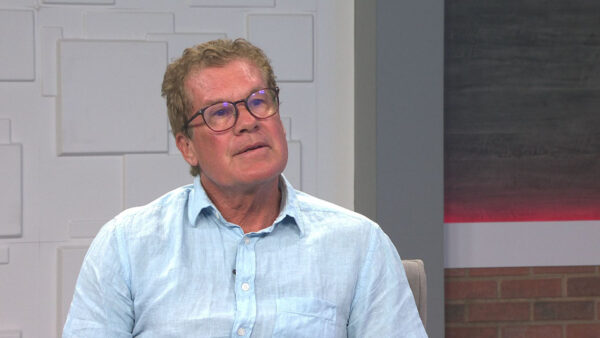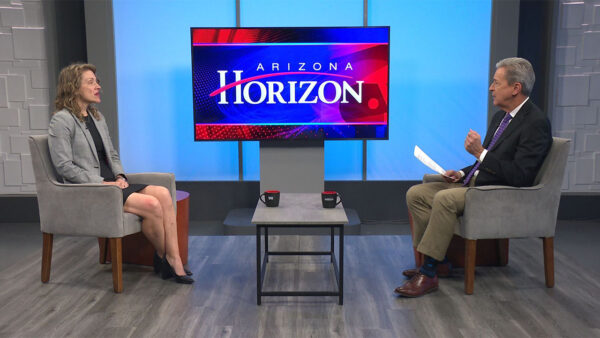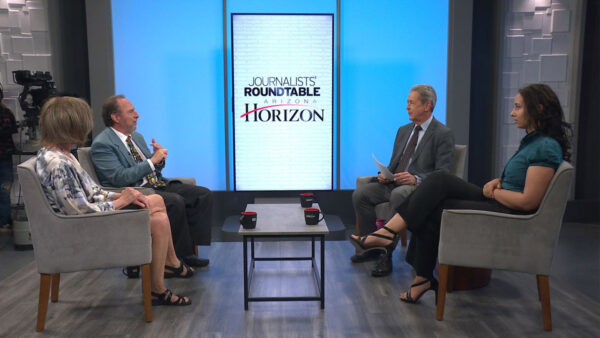A Maricopa County Superior Court judge ruled that a rental car tax that helps fund the Arizona Sports and Tourism Authority will have to be refunded because it was found unconstitutional last summer. That money helps pay for the University of Phoenix Stadium. Peter Corbett of the Arizona Republic will bring us up to date.
TED SIMONS: Coming up next on "Arizona Horizon," a judge rules the tax money to help fund the Cardinals stadium and other sports venues will have to be refunded. We'll update the controversy of wild horses near the salt river. And we'll see how police are cleaning up a crime-ridden area in Phoenix. Those stories next on "Arizona Horizon."
"Arizona Horizon" is made possible by contributions from the Friends of Eight, members of your Arizona PBS station. Thank you.
TED SIMONS: Good evening, and welcome to "Arizona Horizon," I'm Ted Simons. Money collected from a rental car tax to help fund the Arizona Sports and Tourism Authority will have to be refunded, according to a Maricopa County Superior Court judge. The ruling could cost the state over $160 million. Peter Corbett of "The Arizona Republic" is covering the story, good to have you here, thanks for joining us.
PETER CORBETT: Good to see you Ted.
TED SIMONS: Give us an overview of this particular case, it's been going on for a while, hasn't it?
PETER CORBETT: Pretty much a decade. We can go back a year ago when a Superior Court judge ruled that the rental car tax is unconstitutional because it's a tax that should be used for roads and highways. You cannot use it for building a stadium.
TED SIMONS: And the Tourism and Sports Authority, -- they have changed it around a little bit. They are paying down the debt of that football stadium out there, aren't they?
PETER CORBETT: Right. They have $260 million in debt to pay and that's a significant part of their revenue from the -- rental car 3.25% tax, around $12 million a year. That's a serious cut in their revenue.
TED SIMONS: And spring training stadiums, tourism and youth, that was part of the deal to get voters to approve it. But the suit was filed by rental car firms?
PETER CORBETT: Originally on behalf of customers when it went to the Superior Court, the court said it had to be -- the rental car companies were the only standing in the case because they pay the tax to the Arizona Department of Revenue. An appeals court upheld that. If they have to refund the money to the rental car companies the people who actually paid the tax will not see any of that money.
TED SIMONS: That seems unusual, is that unusual?
PETER CORBETT: I think it is. I've not heard of a case like that before. You've got all these customers, tourists spread out all over the country. They will never see the money.
TED SIMONS: Not only is it unusual to say the people who paid the tax aren't going to be the ones who get the tax. It seems odd to say that a tax has been going on for years, you have to refund the money. Isn't it more common to say that the tax is unconstitutional, knock it off?
PETER CORBETT: Or even stranger, that it's going to continue until the case is resolved. They continue to collect the tax and pay it to the Arizona Sports and Tourism Authority.
TED SIMONS: Even though -- literally they could be collecting money, they are going to have to turn around and give it back.
PETER CORBETT: Right. There's some thought whether to put the money in an escrow account or what they do with that in the meantime. But it hasn't been decided. There are a lot of things that haven't been decided in these cases. There are certainly going to be appeals.
TED SIMONS: With that in mind, what are we looking at as far as appeals? How long could the process go?
PETER CORBETT: The plaintiff's attorney John Aitken says he expects the case to wrap up by 2016, and could see a ruling from the appeals court in 16 or 17, and then find out if the Arizona Supreme Court takes the case. That could push it into 2018.
TED SIMONS: If it pushes it into that far ahead, all that time they are going to continue collecting money.
PETER CORBETT: Right.
TED SIMONS: Is there a plan for them to stop this?
PETER CORBETT: We'll see if there's any rulings in that regard, if they put the money in escrow or what they want to do with it.
TED SIMONS: How much money are we talking about to date?
PETER CORBETT: There's as much as $160 million from all of the cases. This initial case that was ruled on yesterday involved $22 million, according to the plaintiff's attorney. All the other time frames could add up to $150 to $160 million.
TED SIMONS: The response from Sports and Tourism Authority is?
PETER CORBETT: They had no response, except the attorneys don't believe the ruling will be upheld, they think the judges have gotten it wrong and they expect to prevail.
TED SIMONS: As far as the state of Arizona. Do we have any response from them?
PETER CORBETT: Nothing yesterday. We tried to reach out to them and did not get a response.
TED SIMONS: The whole thing -- and again, the reason for the ruling, they are saying it's unconstitutional because this is -- the rental car firms are being taxed but the money is not being used that would impact, what?
PETER CORBETT: The roads and highways: It goes back to early in the dawn of the automobile age, there were gas taxes. If you're going to tax people for automobiles and gasoline, the money should be used for roads and highways. So that's why this is carried forward. This is an excise tax on automobile use, and it has to be used for highways.
TED SIMONS: Well, it should be used or must be used?
PETER CORBETT: Must be is the way the judge ruled.
TED SIMONS: If it must be, then who in the world came up with this idea to put this in front of the voters in the first place?
PETER CORBETT: If you remember, in 1999 they went to Mesa and said do you want to tax yourself in Mesa, and the taxpayers said no. Let's find a way, and we'll shift the tax to tourists. We got the 1% bed tax -- and the rental car tax. Voters said sure, we'll do that, we're not going to pay the bulk of that, sure, let's go ahead.
TED SIMONS: No one thought to look back on this and see?
PETER CORBETT: That was what one of the attorneys I talked to today said. Did anybody research this to see if this was legal? Or they thought maybe if we get far enough down road we won't be stopped -- because the horse is already out of the barn.
TED SIMONS: This is just a big horse and big barn. Is there -- it doesn't strike me as settlement possibilities here. It doesn't seem like this is the kind of thing that can be settled.
PETER CORBETT: It seems to me you probably have to consider whether you could arrange another tax to replace the rental car tax.
TED SIMONS: And anyone talking about that yet? Is that still --
PETER CORBETT: I haven't heard anybody talking about that yet. Seems to me that's what they are going to have to talk about. They have some time to do that.
TED SIMONS: What's next here, the appeals process? What's next on the whole thing?
PETER CORBETT: First of all, they have to wrap up this case and decide on attorney's fees, -- that could take months. Then filing appeals and it winds its way slowly through the process.
TED SIMONS: We won't see anything more about this for the next few months?
PETER CORBETT: I don't think so.
TED SIMONS: Peter, great job of covering this.
PETER CORBETT: Thank you, Ted, enjoyed it.
Peter Corbett : Arizona Republic


